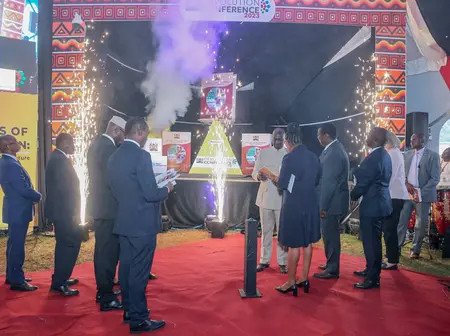Homa Bay, Kenya: As Kenya gears up for the 9th Devolution Conference in Homa Bay County from August 12–15, 2025, the nation reflects on the journey of devolved governance since its inception in 2013.
The conference theme, “For the People, For Prosperity: Devolution as a Catalyst for Equity, Inclusion, and Social Justice,” underscores the need to assess both the achievements and shortcomings of devolution, and to chart a path forward that centers citizens in governance.
Devolution is anchored in Article 174 of Kenya’s 2010 Constitution, which aims to decentralize power, promote national unity through diversity, enhance public participation, protect marginalized groups, and ensure equitable resource distribution.
It empowers local communities to manage their development priorities and participate in governance. However, the question remains whether this constitutional promise has been fully realized in practice.
One of the most visible successes of devolution has been improved access to public services. Counties that were previously underserved have seen significant infrastructure development. For instance, Wajir County increased its health facilities from 40 to 174 in just over a decade, a testament to the impact of localized governance.
Education, agriculture, water access, and infrastructure have also benefited. Early childhood education centers have expanded, and agricultural support programs have reached more farmers. Roads, markets, and industrial parks built by county governments have stimulated local economies and created employment opportunities.
Citizen participation has grown, with county assemblies and public forums allowing residents to influence budgetary decisions and development priorities. Kakamega County’s adoption of public participation and open governance policies exemplifies how counties can involve citizens in decision-making.
Devolution has enabled counties to invest in local economic development. Projects such as slaughterhouses, markets, and agro-processing facilities have boosted income generation and employment. These initiatives have helped decentralize economic activity, reducing the overreliance on major urban centers.
Despite these gains, devolution faces significant hurdles. Corruption and mismanagement remain rampant. The Auditor General’s 2024 report revealed that over KSh 12 billion was unaccounted for across various counties. Inflated tenders, ghost projects, and misuse of funds plague county administrations.
County governments often fail to declare actual revenue figures, creating loopholes for embezzlement. Many resist automating revenue collection systems, preferring manual processes that are easier to manipulate.
The Ethics and Anti-Corruption Commission (EACC), led by Dr. David Oginde, has made arrests such as the detention of six Busia County officials over a KSh 1.4 billion tender scandal but prosecutions often stall. Some suspects even return to politics, eroding public trust.
The delayed transfer of functions from the national government to counties has hindered service delivery. President William Ruto’s 2023 and 2024 pledges to complete the transfer remain largely unfulfilled. Critical services like agriculture, water, and roads are still managed by national parastatals, leading to duplication and inefficiency.
Public participation remains weak in many counties due to the absence of clear legal frameworks. While some counties have made progress, many citizens, especially youth and persons with disabilities (PWDs) feel excluded. The KSh 20,000 delegate fee for the conference has sparked criticism, as it effectively bars ordinary citizens from attending and voicing their concerns.
Funding disputes between the national and county governments, particularly over equitable share allocations, have led to service delays and strikes by county workers. Suppliers and contractors also suffer due to unpaid bills, sometimes facing auction.
Marginalized groups, including unemployed youth and PWDs, feel underrepresented in governance and employment. Despite constitutional provisions for their inclusion, many counties fall short in implementing inclusive policies.
The poor state of schools in Tharaka Nithi County, with muddy classrooms and unsafe latrines, underscores the urgency of devolving resources and responsibilities effectively.
Oversight mechanisms remain weak. The EACC’s efforts are often undermined by slow judicial processes and political interference.
Arrests are sometimes theatrical, with little follow-through in terms of convictions. Citizens are frustrated by the lack of accountability and the impunity enjoyed by corrupt officials.
Disputes between the Senate and National Assembly over revenue allocation have delayed disbursements, affecting service delivery.
The Intergovernmental Relations Technical Committee (IGRTC), tasked with resolving disputes, lacks financial independence, compromising its neutrality. Of 42 disputes recorded since 2020, only 17 have been resolved.
The upcoming conference must go beyond ceremonial speeches. Article 174 should guide discussions on equity, inclusion, and social justice. The civil unrest in June 2024 and June 2025 highlighted the urgency of addressing youth and marginalized group concerns.
To combat corruption, the government must enhance investigative and prosecutorial efficiency. Laws should be enacted to expedite economic crime trials and impose harsher penalties. The national government must also ensure timely release of funds and resolve disputes over revenue-sharing formulas to support lagging counties.
The transfer of functions must be completed, with resources following responsibilities. This will eliminate duplication and improve service delivery. Counties must also embrace automation and transparency in revenue collection.
Finally, the conference must result in actionable resolutions. Stakeholders should commit to implementing and tracking progress. It must be a call to action to confront challenges head-on and reimagine devolution for the next decade, one that truly serves the people and fosters prosperity for all.

Leave a Reply